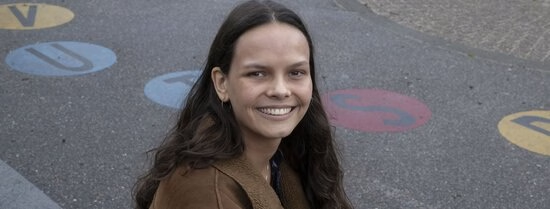In the Netherlands, there is a significant need for more teachers. To address this problem, several universities have established the Educational Master in Primary Education (EMPO). The first students will complete this program in 2024. At Erasmus University, education is emphasised in a metropolitan context, with diversity as a central theme. We discussed this with second-year student Indy de Lyon. “I think it is essential to contribute to more inclusive education.”
If you consider becoming a primary school teacher, the Teacher Training College (PABO) will probably come to mind. It has been possible for two years through an educational master's degree at Erasmus University. The teacher training college usually aims at young people who have graduated from senior general secondary education (HAVO) or pre-university education (VWO). At the same time, the EMPO attracts students who have already completed a university bachelor's degree. For example, De Lyon already has a bachelor's degree in psychology. "After obtaining my diploma, I was unsure whether I wanted to specialize further in that field or whether I wanted to take a new direction. I had always thought teaching would be fun, so I started exploring the possibilities."
Focus on diversity and metropolitan educational needs
The EMPO focuses specifically on primary education within a metropolitan context. “This means that we work with diverse students, often with different ethnic backgrounds and socio-economic situations.” Students at the EMPO are trained to reflect on this in more depth and consciously think about these children's specific needs. This aspect is usually less extensively addressed at teacher training colleges. “At teacher training colleges, there is often more focus on general educational techniques, without the explicit emphasis on working in more diverse, metropolitan environments.”
Furthermore, EMPO offers a strong scientific basis for educational practice. Students delve into research and literature on pedagogy, academic theories and didactics. They learn what works, why certain educational strategies are effective, and how they can conduct research in the classroom. “During our studies, we are less concerned with learning practical skills. We mainly gain these experiences during our internships.”
Making Dutch education more inclusive
Als bijbaan gaf De Lyon bijles aan verschillende kinderen. Eerst voornamelijk aan kinderen via een bijlesinstituut, waar ouders de bijles zelf moeten betalen. Daarna gaf ze bijles op een VMBO-school, waar het aangeboden werd vanuit de school zelf. “Het was een heel diverse groep waardoor ik mijn benadering moest aanpassen”. Enthousiast zegt De Lyon dat ze dit juist heel leuk en uitdagend vond. “Tegelijkertijd werd ik ook bewust van kansenongelijkheid in het onderwijs. En doordat dit me zo raakte zocht ik naar manieren om te kunnen bijdragen aan een inclusiever en eerlijker onderwijsklimaat.” De keuze voor de EMPO was dan ook snel gemaakt. Je ontwikkelt hier tools en handvatten om het onderwijs in Nederland inclusiever en rechtvaardiger te maken voor alle kinderen, ongeacht hun achtergrond of sociaaleconomische status.
Education faces significant challenges, especially in the metropolitan context
Primary schools in a metropolitan context are often very diverse, with a mix of different cultures, languages and socio-economic backgrounds. Therefore, teachers must be sensitive to cultural diversity and know how to handle varying parenting styles, norms and values. “Inclusive language use is important, for example, but also that you can substantiate why you do or do not choose to organize Purple Friday.”
The EMPO students learn, among other things, how to integrate as many different perspectives and experiences as possible into their lessons. “Children with a migration background, for example, have different associations or knowledge about certain themes, such as slavery, than children without that background.” In her history lesson about the history of slavery, she added female examples to give a broader picture of history. “Role models are important because you want all social groups to feel represented.”
What makes the EMPO so unique, De Lyon explains, is that students learn how to create as many opportunities as possible for their pupils. They do this by offering inclusive education, considering students' different backgrounds, and remaining open-minded about their role as a teacher and the difference they can make. “I am happy that I can contribute to society in this way and have an impact on children from different backgrounds.”
After completing the EMPO
After completing the EMPO, De Lyon would like to be in front of the class, but she does not see herself doing this five days a week in the long term. “I do not only want to teach but also contribute to a greater change in education. In the future, in addition to teaching, I would also like to contribute more on a broader level, for example, within the school organization, the management, or in a teacher training program.”
- More information
This interview is part of Spark. With these interviews, we aim to draw attention to the positive impact of the faculty's education and research on society. The stories in Spark give an insight into what makes ESSB students, alumni, staff and researchers tick.
Contact: Britt van Sloun, redactie en communicatie ESSB, vansloun@essb.eur.nl

